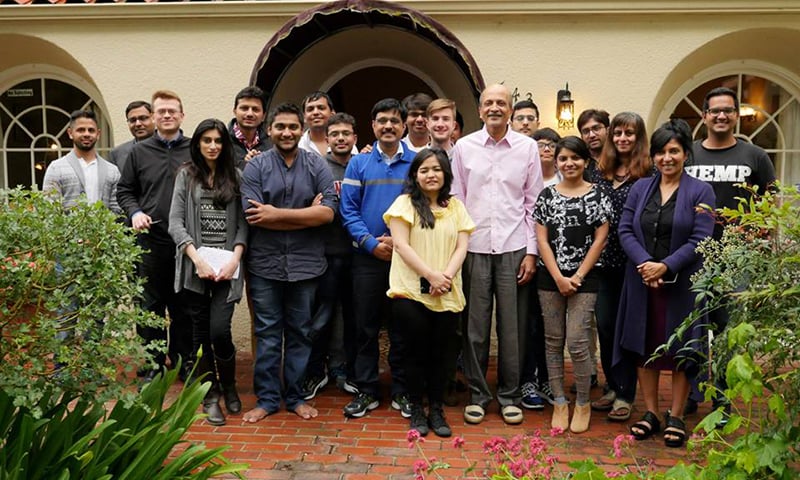It’s a breezy Sunday morning when I am warmly greeted into Asha Jadeja’s home located in Palo Alto, California. The prospect of meeting a leading venture capitalist from Silicon Valley who has invested in more than 100 tech start-ups in 15 years is both implausible and intimidating.
Originally from Ahmedabad, India, Jadeja is one of the first few women venture capitalists, angel investors and philanthropists in Silicon Valley. She invests in for-profit tech, internet and high social impact start-ups in the Bay Area, Boston, New York, Africa and India.
Clad in a casual black dress, she welcomes me with a smile. Her warm, humble personality sets the tone for the conversation. She speaks with great particularity and certainty.
“I want to create a civilian bridge between India and Pakistan by introducing Maker Fest in Pakistan earlier next year...this would be my first investment in Pakistan” Asha Jadeja says, as our talk begins.
Maker Fest Pakistan will be a social event where tech-innovators, creators, artists and hobbyists from across the country will showcase their devices, inventions and products created without proper support.
Maker Fest is a continuation of Maker Faire, which is hosted across America, Europe, Africa and Japan, among other locations. Maker Faire was launched in California in 2006 and now hosts hundreds of thousands of attendees twice a year.
“I have been attending Maker Faire in California for the past many years and I have seen the impact it can have. One of my friends from Nigeria got me into funding the Cairo Maker Faire, and from there it expanded to other countries. After witnessing its success, I decided to introduce it in India to catalyse innovation and entrepreneurship at the grassroots level.”
Introduced three years ago, Maker Fest India immediately spread across the country.
Jadeja hopes that Maker Fest would become a growing movement in Pakistan as well. Jadeja has yet to visit the country, but she hopes to attend the launch of Maker Fest in Lahore early next year.
Pakistan and India binded together
Jadeja is devoted to peace between India and Pakistan and says that she along with her husband Rajeev Motwani (deceased) had always wished to support and encourage entrepreneurs in the subcontinent.
Talking about her husband's link with Pakistan, Jadeja said, "Rajeev's parents had migrated from Sindh, Pakistan."
“He has centuries-old roots on the Pakistani side of the border and therefore, it was our joint commitment to bring peace and economic prosperity to the subcontinent."
Rajeev Motwani is known world-wide as a mentor to Google’s founders Larry Page and Sergey Brin. “I met my husband in Berkley and we got married in 1999. We have two daughters,” Jadeja says.
Her eyes glow with pride as she reminisces about Professor Motwani’s accomplishments: “Our legacy hasn’t changed the world but I feel gratified that any time anybody does a search on Google, they are using Rajeev’s algorithm.”
Professor Motwani closely collaborated with Brin and Page while writing an influential early paper on Page Rank algorithm, which formed the basis for Google's search techniques. After Google was founded, he became a member of Google’s technical advisory council. Professor Motwani’s research spanned various fields such as databases, data mining, data privacy, web search and robotics.
He also authored several books including two widely used theoretical computer science textbooks: 'Randomized Algorithms' and 'Introduction to Automata Theory, Languages, and Computation'. In 2001, he was awarded the prestigious Gödel Prize for his work on the PCP theorem and its applications.
“Today, whenever you use a piece of technology, there is a good chance a little bit of Rajeev Motwani is behind it,” was the tribute paid by Sergey Brin after Rajeev Motwani’s death in 2009.
Empowering India/Pakistan entrepreneurs
Motwani's efforts for Pakistan and India continue however.
"Rajeev Circle (RC) Fellowship program's objective is to help budding entrepreneurs from India and Pakistan to network and connect with our resources in the Sillicon Valley," added Jadeja.
The group of mentors for Rajeev Circle Fellowship has around 300 members from Stanford University, UC Berkeley, Massachusetts Institute of Technology, Google, and various portfolio companies Rajeev Motwani and Asha Jadeja have funded over the last 15 years.
 |
| Asha Jadeja with RC Fellows in Palo Alto |
“All entrepreneurs theoretically know what to do, they know about angels and are aware of raising capital but because of a lack of mentors in our countries, the right kind of mindset about risk taking and learning from failures remains missing," explains Jadeja.
She adds that the mindset in Pakistan and India is driven by scarcity and competition. The secret of success in the Sillicon Valley, is a mind which acknowledges abundance and collaboration.
“Our focus is to shift the mindset from one of scarcity and competition to that of abundance and collaboration. It is about absorbing the dynamics of the Bay Area.”
Explaining the program, Jadeja says, "I don’t have a standard criterion for picking up fellows. I have my own metrics that are based on my gut feeling. Doing well alone is not as important for me, their work should spill over into other circles and create a social impact."
'Fearless' from Pakistan
Jadeja explains further on how she is supporting entrepreneurs from Pakistan. “The young entrepreneurs and activists from Pakistan are fearless, courageous and care deeply about the world around them. I feel that the Pakistani youth is putting their efforts into causes that make a positive social impact, which is humbling, at the very least."
"While in India, we are able to reap all the benefits of economic development, the Pakistani youth is involved in a struggle for survival despite all the threats and dangers. As a mother, I feel worried that they are putting themselves in danger and still bravely sticking out their necks.”
Asha Jadeja has expansive plans; she hopes to create a collaborative bridge between India and Pakistan through the RC fellowship. Maker Fest Pakistan is going to be a high impact collaboration between Indians and Pakistani fellows; she hopes that at least one or two Pakistani start-ups having roots in the valley will spin out of the fellowship.
“The collaboration would not only be at subcontinent level but potentially at a global level," remarks Jadeja
Talking about relations between India and Pakistan, she says peace is crucial now, as is the need for better economic ties. “We need to engage more in business and trade. Let the trade flourish and our region will benefit from it. Peace is not only a good idea at the moment, it is a smart choice.”
A subcontinental market
Jadeja believes that the subcontinent is a huge market, and following the example of the European Union, if Pakistan and India were to collaborate, it would lead to a very powerful market which can give China a run for its money.
“The Indian subcontinent as a bloc is so powerful that we will be second to China in terms of purchasing power and trade. It is crucial for us to collaborate as a group in the South Asian region," she claims. Her efforts are just one small step towards making this happen.
"The movement must accelerate as we can’t afford to slow down.”
Sehyr Mirza is a freelance journalist and classically trained vocalist from Lahore. She tweets @SehyrMirza












































